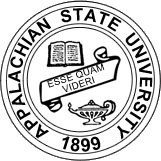
Appalachian State University
Appalachian State University (/ˌæpəˈlætʃən/;[a] Appalachian, App State, App, or ASU) is a public university in Boone, North Carolina. It was founded as a teachers college in 1899 by brothers B. B. and D. D. Dougherty and the latter's wife, Lillie Shull Dougherty. The university expanded to include other programs in 1967 and joined the University of North Carolina System in 1971.[6]
Former name
Watauga Academy (1899–1903)
Appalachian Training School for Teachers (1903–1925)
Appalachian State Normal School (1925–1929)
Appalachian State Teachers College (1929–1967)
"To Be, Rather Than To Seem"
1899
$150 million (2022)[2]
Heather Hulburt Norris (interim)
21,253 (2023)[3]
Distant town, 1,300 acres (5.3 km2)[4]
The Appalachian
Black and gold[5]
The university enrolls more than 20,600 students.[7] It offers more than 150 bachelor's degrees and 70 graduate degree programs, including two doctoral programs.[8][9] The university has eight colleges: the College of Arts and Sciences, the Walker College of Business, the Reich College of Education, the College of Fine and Applied Arts, the Beaver College of Health Sciences, the Honors College, the Hayes School of Music, and University College. It opened an additional campus in Hickory in 2023.[10]
The Athletic Teams compete in the Sun Belt Conference, except for a few sports that compete in the Southern Conference, such as wrestling. The teams are known as the Mountaineers.
Academic rankings
3
315
601–800
Appalachian has invested in several sustainability projects in recent years such as:
In media[edit]
In 2004, a committee for the Appalachian Family Caravan tour created a promotional video titled "Hot Hot Hot", shown throughout the area by Chancellor Kenneth E. Peacock. The video became an inadvertent internet phenomenon and was featured on VH1's Web Junk 20 program in early 2006.[59] The video was never intended to promote Appalachian State to anyone but the Family Caravan, much less as a recruiting tool for prospective students. The video is no longer used by the university, due to student and alumni protests.
In 2002, MTV's program Road Rules visited App State to produce an episode called Campus Crawl, aired on-campus during an annual, winter student swimming event called the "Polar Plunge". The show's participants also crossed a high-wire strung between Coltrane and Gardner Halls.
On March 16, 2012, Appalachian State placed a tenured sociology professor on administrative leave for a variety of charges, which included showing an anti-pornography documentary, The Price of Pleasure. This move gained national attention from the academic community.[60]